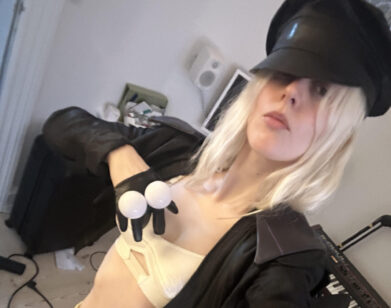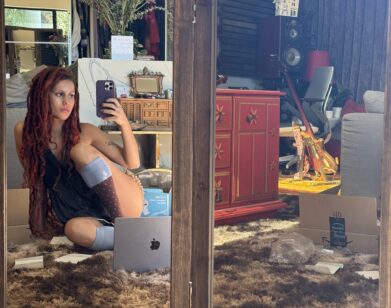Putting Their Dukes Up

ABOVE: THE DUKE SPIRIT. PHOTO COURTESY OF STEVE GULLICK
Over six years and three albums, The Duke Spirit is the rare UK band that’s been as embraced in America as in its homeland—if not more so. That’s owing to a garage/post-punk hybrid sound that gets regularly described with terms like “no-nonsense” and “straight ahead;” to their affiliation on second album Neptune with SoCal sultan of stoner rock Chris Goss and desert mecca Rancho de la Luna; and to notable support slots on recent tours with US heavy hitters like R.E.M. and Queens of the Stone Age.
For their latest, Bruiser, whose bellicose title is matched by a ram’s head on the cover, The Duke Spirit returned to California, and the home studio of LA music vet Andrew Scheps. While still plenty fiery—and boasting one of alt-rock’s most compelling frontwomen in Liela Moss—what’s emerged on Duke Spirit 3.0 is a record that smoothes off the rough edges and dials back some of the fuzz that earned them early Cramps comparisons, and opens things up for something for more breezily melodic, varied, and sweeping. Or, as you’ll see below, in the words of the band, more “grand.” Bruiser was released digitally in November, a long three-and-a-half years after Neptune; it arrives physically later this month; and the road warriors expect to be touring on behalf of it for most of the next year. At New York’s Thompson LES, we recently sat down with three-fifths of The Duke Spirit: Moss, guitarist Luke Ford, and drummer Olly Betts.
JOHN NORRIS: It has been a long time since I was standing with you guys in a park near Bowery Ballroom, talking about Neptune—more than three years. I know you toured a lot with that record, but was there ever a concern you might be waiting too long for this release?
LIELA MOSS: It’s always a concern, but the bottom line is, there’s always budgets needed to get new records done. I mean, we could have put this album out a year ago if we’d wanted to. But how would we have done it, through what channels, through what distribution? We could have done it by ourselves and sent it to our friends and sort of stood on a corner and said “Our record’s out.” But the truth is, we waited because Fiction, who we’re working with in the UK and Europe were liaising with the USA, and they just said “Can you wait? Because we’re so busy right now and we really want to work with you later in the year.” And yeah it’s a concern for your fans, you kinda go, “Oh no, what do people think we’re doing?,” but the thing is, it takes time and money and people to be working on behalf of your output, and sometimes you just have to be patient.
NORRIS: And there was an EP last year as well, Kusama. You’ve hardly been idle.
MOSS: Yeah, two of the EP songs are on the new album. And we did some other things as well, like we did a track for the Arkham City, the Batman thing that’s just come out, and other stuff. And I think that’s the back story that people don’t know: if you’ve got tons of money, you can just put albums out all the time. And I would love to do that, but if not, you may be writing a song for a soundtrack, or putting together an EP or finishing your album.
NORRIS: Alternate revenue streams as they call them nowadays.
MOSS: Yeah! [laughs] But we’ve been keeping busy, and you realize you connect with fans in weird and wonderful places, and you have to go back there. From Berlin to Sri Lanka, from Canada to California. It keeps you busy.
NORRIS: A lot of the early reaction to Bruiser has been about this rather dramatic shift in sound. And I think what a lot of people mean is that it’s a cleaner-sounding production, maybe by about 30% compared to Neptune. Would you agree?
MOSS: 32%, maybe? [laughs] I don’t know, I don’t think we’ve ever used the word “clean” in talking about this record at all. I think all that’s really happened is that there’s in a sense more of a separation in sound between the guitars, a bit more streamlined, articulated melodies, with maybe a more direct attitude. We’re letting the vocals breathe, letting the guitar come in and do its thing, and not necessarily slamming to guitars in there from the top, all the way through. Which is kind of how we expressed ourselves in the beginning, and it was very potent. And now I think we’ve made a point of keeping the force, but allowing every melody to have its own space to breathe.
NORRIS: Less fuzz, fewer effects?
LUKE FORD: Well, keep in mind there’s been a slight change around in our lineup anyway. Toby [Butler], who now plays guitar, was our bass player on the previous two albums, and our other guitarist, Dan, left the band. And another good friend of ours [Marc Sallis] joined and took over bass. So, there was inevitably gonna be change. I think Toby’s got a different style. I think I’m still kind of plowing the destructive noise route, whereas Toby’s maybe more of throwing in lead sort of parts, things like that. So it’s more of a, and I think that was bound to change the sound of it.
OLLY BETTS: There’s definitely, I think on this record we definitely tried to make the instrumentation count a bit more, so I don’t think you can say it’s necessarily less fuzzy, but it’s just that when the fuzz comes in, something else is taken away, just to make the point that it’s there. Rather than having everything happen all at once?
MOSS: It was just, let’s have space, let’s hear a melody, let’s even dare to have some guitar solos. But only short, really short ones. They make their point really quickly and then get the hell out of there. None of these arrogant solos, that’s not really our thing.
NORRIS: So it was back to California with this record, where of course you had been to do Neptune in Joshua Tree with Chris Goss. Is there any reason you’re especially fond of LA, or of Southern California? Or is it that just where Andrew Scheps was?
MOSS: On a practical level, we knew that Andrew could make this work, and it was a practical decision. And in fact I think to begin with, I think we were very much like “We’ve spent a lot of time in America, we don’t want to seem like we’ve sort of ditched our heritage,” or something. Because actually a lot of what inspires us are those cold rainy European days, ones that sort of force you to be contemplative, and not just having a totally awesome time in the sun.
NORRIS: That gray and rainy thing is very much present in the video for “Northbound.” It’s nice and overcast, which I love.
MOSS: Yeah you know? You need a little bit of revolting faded glamour in your life from time to time. A derelict beach town in Essex.
FORD: Yeah, though that is possibly the most terrifying place. It’s this town called Jaywick, in Essex, and it’s…
MOSS: Run-down.
FORD: Really “edgy,” which you don’t really see it in that video, but we were actually quite fearful of getting out of that place alive.
MOSS: Yeah, trying to make this short film and walking on sand dunes and up streets in a gold jacket and curly hair. You don’t want to know the abuse that was being shouted at us by the locals.
NORRIS: That song, “Northbound” has this—especially vocally—this really dramatic, Scott Walker, ’60s feel to the delivery on it.
MOSS: Yeah, that’s interesting. Personally, I wasn’t overly conscious of it, but I think I was less afraid on this record to perhaps be a bit more “grand”? I think this album, to me, is us just making a little bit more of a grand gesture. And I think if I’d heard myself say this a few years ago I’d have been like, “Ugh, how pretentious,” but actually, you know, talking about the high-energy, scuzzy, fuzzy thing, we’ve done that, we’ve explored it. And while we’ve definitely never given up on that exuberance on stage and letting people feel that palpable energy. But when it came to this record I think we were unafraid to enjoy things like space and soaring choruses.
NORRIS: Less compelled to “rock” 24-7?
MOSS: Yeah, just take the “r-a-w-k” out and be languid at times, and ferocious at other moments, but we felt like sweeping gestures were just good to explore.
NORRIS: Olly, you contributed a rather shimmering track to the new album as well?
BETTS: Yeah it’s called “De Lux.” And it was written right after we got off our long touring with the last album. When you come off tour, you’re in a very weird space really…
MOSS: You don’t know what to do.
BETTS: Yeah you go from being quite institutionalized in a way, ’cause you’re sort of told what to do—you know, you’re going to a different town every day, and you’re playing, then you come back and you feel quite lost. And at the time, I was homeless, because there’s no point in paying rent when you’re on tour for like two years. And so I was back with my folks, really, and just plugged my guitar into a record player…
MOSS: Into your record player?
BETTS: Yeah.
MOSS: What was it, like an amp?
BETTS: Yeah, which actually ended up being on the record, because it was just such a weird sound. Just a thin old ’50s record player. So, it was cool, it was a nice month in my life where I felt quite creative just in the middle of nowhere, the countryside in the middle of England. It’s a very inspiring place to go and just kind of work out what you’re gonna do, you know? And also what you’ve just done, because we had the most amazing time. And looking through film and photos and coming home and thinking, “Did that just really happen?,” you know, we’d just toured like the States for three months over the summer and… pictures of Luke in like crazy swimming trunks.
MOSS: Is that what you put up in your room, Olly? Do we need to talk? So, “De Lux” is inspired by Luke in his swimming trunks. There you go!
NORRIS: And Bruiser—there’s a pugilistic spirit in that title. Do you guys feel that way at all?
MOSS: Well, it’s like you come back from a lot of touring and people are waiting for your record and are like “When’s it gonna come out?” And everything was charged with “We’ve got to make it happen,” that we’ve got to push things through. And there’s a bit of brutality to being in a group you know? There’s something brutal about it, not just physically and travelling and onstage, but also the ferocity of some of the tunes, and I thought it pretty much sewed up the experience.
NORRIS: And speaking of touring, you’re gonna be out there with this album for the foreseeable future?
MOSS: You know us, we don’t stop. Once the wheels roll, give us a couple of years and then we’ll find our way home again. I just think you have to be really generous with your time and go as many places as you can all the time, to sort of create the illusion that you’re “everywhere.” We’re gonna get it right this year!
BRUISER IS OUT PHYSICALLY ON JANUARY 17. SEE JOHN NORRIS’ VIDEO INTERVIEW WITH THE BAND SOON ON NOISEVOX.






